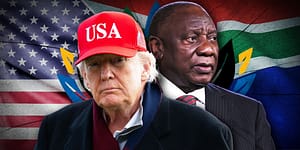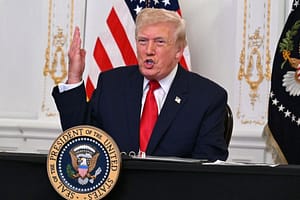Wall Street suffered another sharp decline Wednesday as mounting concerns over newly implemented trade tariffs sent investors scrambling. The Dow Jones Industrial Average dropped 450 points, marking its second consecutive day of steep losses. The S&P 500 and Nasdaq Composite also fell, losing 1.7% and 2.1%, respectively.
Market Reacts to Fresh Tariffs

The latest slide in stock prices comes in response to the U.S. government’s implementation of new tariffs on Chinese imports, totaling an estimated $60 billion in affected goods. The tariffs, aimed at addressing ongoing trade imbalances and alleged unfair practices by China, were met with immediate retaliation, as Beijing announced its own countermeasures, imposing levies on a wide range of American exports, including agricultural products, automobiles, and technology components.
“Investors are worried about the potential long-term impact of a prolonged trade war,” said Jennifer Carter, chief market strategist at Evermore Capital. “Markets hate uncertainty, and right now, we’re seeing a lot of it. Companies that rely on global supply chains are getting hit the hardest.”
Sectors Feeling the Pinch
The technology and manufacturing sectors bore the brunt of the sell-off. Apple Inc. fell nearly 3% as concerns over higher production costs loomed, while semiconductor giants like Nvidia and Intel also saw their shares decline sharply. Meanwhile, heavy machinery maker Caterpillar, often considered a bellwether for global trade, slid 4.2% as fears of decreased demand from China weighed on investor sentiment.
Retail stocks also struggled, with Walmart and Target posting losses as analysts warned that higher import costs could eventually be passed on to consumers.
Investors Flee to Safe Havens
As equities suffered, investors sought refuge in traditional safe-haven assets. The yield on the 10-year Treasury note fell to 3.8% as bond prices rose. Gold prices also surged, climbing 1.5% to reach a new three-month high.

“The market is showing classic risk-off behavior,” said David Klein, an analyst at Keystone Investments. “When geopolitical tensions rise, investors look for stability in bonds and gold.”
White House Defends Trade Policy
Despite market turbulence, the Biden administration defended the tariffs, arguing they are necessary to level the playing field in international trade.

“These actions are designed to protect American industries from unfair competition and to encourage fair trade practices,” a White House spokesperson said in a statement. “We remain open to negotiations but will not back down from defending U.S. economic interests.”
However, business leaders and economists are raising concerns about the potential economic fallout. Some warn that if the dispute escalates further, it could weigh on corporate earnings and consumer spending, potentially slowing down economic growth.
What’s Next for the Markets?
Analysts suggest that market volatility may continue in the short term, especially as investors await further developments in trade negotiations. Some experts believe that diplomatic efforts could lead to a de-escalation of tensions, while others fear a prolonged trade war that could drag down global economic growth.

“We’ll be watching corporate earnings closely,” said Carter. “If companies start reporting significant impacts from these tariffs, we could see more market downside.”
For now, traders are bracing for more turbulence as Wall Street adjusts to the latest economic headwinds.
Texas Emerges as America’s Auto Finance Powerhouse — Here’s Why the State Leads the Industry
Discover more from News Diaries
Subscribe to get the latest posts sent to your email.




